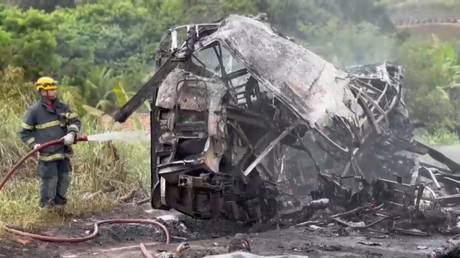North Carolina college students describe the disruptions they’ve faced since Hurricane Helene hit.
Courtesy of: Aly Andrews, Asa Hoffman, Ashley Wahlers, Abby Nelson
Hurricane Helene has devastated communities in North Carolina.College students in the area have had classes canceled through at least the end of the month.They described the scramble to contact their parents and the limbo they’re facing in the aftermath.
Abby Nelson, 18, went to a Walmart near West Carolina University’s campus at 8 p.m. on September 28, just hours after Hurricane Helene hit the North Carolina area and wiped out cell service.
She heard there was a cell signal in the Walmart, so she ventured to the store to call her parents in Illinois and give them an update.
“There was a crowd of about 100, 200 students sitting in the middle of a Walmart in the tech department trying to call our parents,” Nelson told Business Insider. She said she called her mom from someone else’s phone because she didn’t yet have service on hers. “I was trying to contact anyone I could just so I could make sure they knew I was OK,” she said.
Nelson was among thousands of college students across North Carolina who experienced disruptions, including class cancellations through at least the end of October. While some managed to leave campus and go home, Nelson wasn’t able to make it back to Illinois. She waited on the WCU campus to learn what the rest of the semester would look like.
Abby Nelson, a WCU student, had to huddle in a Walmart to call her parents after Hurricane Helene hit.
Courtesy of Abby Nelson
The impact of Helene has been devastating. At least 215 have died, hundreds are missing, and over half of the deaths were in North Carolina. Nelson said she never could have anticipated the aftermath of the hurricane.
“I had close peers who had family who lost power and service, and I have a friend whose house was entirely gone by that flood a couple hours away,” Nelson said. “So there was a lot of pain and anxiety in the community, especially in the college over this past weekend from Saturday to Sunday as well, as we found out what was happening around us.”
WNC, the University of North Carolina Asheville, and other colleges in the state have canceled classes until the end of October as they work to repair damage on campus and restore power and water. College students impacted by the hurricane told BI that while their communities have banded together to help those in need, they’re also left in limbo regarding their classes, finances, and plans for the future.
“Entire towns are destroyed, and there’s so much flooding and so much hurt, it’s a lot to take in,” Nelson said. “That’s been a hard part, as well, about being in college here because I’m just not used to the hurricanes around any of these states. So it’s just been a lot of anxiety and unsureness about that, as well.”
‘You don’t realize how many things you think about once you’ve been displaced’
Asa Hoffman and Ashley Wahlers, both 21, are seniors at UNC Asheville, where classes are canceled until October 28. Having grown up in central North Carolina, Hoffman said he was used to hurricane season and didn’t think Asheville would be too severely impacted. But after the campus lost power, water, and any contact with family members off campus, the scale of the hurricane began to set in.
Hoffman and his girlfriend Wahlers left campus on September 28 to stay at his home in Chapel Hill. Wahlers said that she waited in line at the gas station for three hours, and she realized that the card readers weren’t working and she didn’t have any cash, so a woman at the station filled up the tank for her.
While Hoffman and Wahlers have received periodic communications from the university on the next steps, they didn’t realize how disruptive the hurricane had been until they left campus.
“When we first got back, a lot of it is just figuring things out,” Hoffman said. “You don’t realize how many things you think about once you’ve been displaced.”
Ashley Wahlers and Asa Hoffman left UNC Asheville after Hurricane Helene hit the campus.
Courtesy of Ashley Wahlers and Asa Hoffman
For example, Hoffman said he was supposed to take the LSAT in Asheville when Hurricane Helene made landfall, and he’s not sure when he’ll be able to take it now. And with his job being based in Asheville, he’ll have to turn to alternate routes to make money, including working for DoorDash.
Nelson also noted that the situation with her financial aid is uncertain. She’s financing her education largely with student loans, and she’s not sure how the class cancellations will impact her tuition payments.
Amid the limbo period with their college educations, the damage in their communities is taking a toll. Wahler’s hometown is in Yancey County, which has suffered severely from the hurricane, and she said that her “town is destroyed.”
“It’s so sad to see my parents’ neighborhood completely destroyed, and a house got taken away at the bottom of the neighborhood. And my sister, her husband’s nana, she lost her house, and she lost everything. It’s just awful. I grew up here, and that is my home. And so it’s just upsetting.”
‘This is something that we had to get through on our own’
Aly Andrews, 19, went to a classroom on WCU’s campus on September 28 that had about 20 to 30 different landlines, and she stood in line to use one of the phones and make a call to her parents.
For the rest of the day, she sat in her dorm room and searched for news of destruction in the areas around her. She said her “mind was truly blown” at the loss of property and lives caused by the hurricane.
“For a majority of us, we had never been in this situation like this by ourselves,” Andrews said. “We’re college students, 19, 20, and 21-year-olds, and this was the first time that we were in a major life event, and we didn’t have any way of contacting our parents. This is something that we had to get through on our own.”
Aly Andrews stood in line to use a landline phone on WNC’s campus.
Courtesy of Aly Andrews
Recovery efforts for Hurricane Helene continue. President Joe Biden’s administration approved over $20 million for hurricane survivors and deployed up to 1,000 troops to deliver food, water, and supplies to impacted communities.
But the recovery will take a while. Patrick Curry, 26, a student at UNC Asheville, told BI over text — because he did not have enough signal to speak on the phone — that not everyone can apply for FEMA aid because of the lack of power and Internet access.
“This storm crippled the area,” Curry said. “I used to work in hospitality in Asheville and a lot of people I worked with have lost everything. No one can work right now and rent was due yesterday.”





+ There are no comments
Add yours